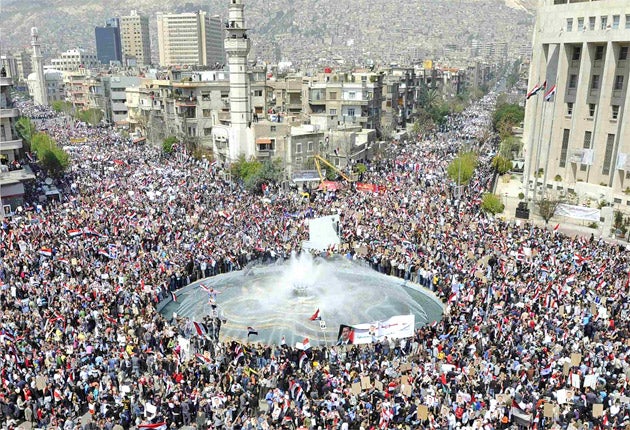Assad hopes Syrian cabinet's resignation will defuse protests

Your support helps us to tell the story
From reproductive rights to climate change to Big Tech, The Independent is on the ground when the story is developing. Whether it's investigating the financials of Elon Musk's pro-Trump PAC or producing our latest documentary, 'The A Word', which shines a light on the American women fighting for reproductive rights, we know how important it is to parse out the facts from the messaging.
At such a critical moment in US history, we need reporters on the ground. Your donation allows us to keep sending journalists to speak to both sides of the story.
The Independent is trusted by Americans across the entire political spectrum. And unlike many other quality news outlets, we choose not to lock Americans out of our reporting and analysis with paywalls. We believe quality journalism should be available to everyone, paid for by those who can afford it.
Your support makes all the difference.President Bashar al-Assad yesterday accepted the resignation of the Syrian cabinet in an attempt to defuse protests against his rule as hundreds of thousands of people attended pro-government rallies in most of the country's cities.
Syrians were awaiting a speech by President Assad, who has remained silent during the 11-day crisis, laying out reforms including the lifting of the 50-year-old state of emergency. Protesters will want to see a real reduction in the arbitrary power of the security forces and guarantees of greater political and civil rights.
The president has a core of support and many Syrians are fearful of sectarian divisions turning to violence. But the turnout for yesterday's demonstrations, dubbed "loyalty to the nation marches" where marchers chanted "the people want Bashar Assad" was enhanced by schools and other state institutions being closed for the day.
The resignation of the cabinet is largely symbolic since it holds little power, which remains in the hands of the president, his relatives and senior officials in the intelligence apparatus. Naji al-Otari, the prime minister since 2003, is to remain caretaker until a new government is formed.
The government still appears divided on how it is going to respond to the unprecedented unrest which has so far led to at least 61 protesters being killed, mostly in and around the southern city of Deraa.
There has also been violence in the port city of Latakia on the Mediterranean coast, where the population is divided between the Sunni and the Alawites, the minority Shia sect to which the Assad family and other members of the ruling elite belong. Troops are patrolling streets in the centre of the city while unofficial vigilantes have set up barricades in the outskirts.
In Deraa people are increasingly calling for a change of regime, but it is highly unlikely that the state security apparatus will allow its power to be diluted significantly. President Assad, a 45-year-old British-educated doctor, was seen as a possible reformer when he succeeded his father, President Hafez al-Assad on his death in 2000. But the changes he introduced were largely cosmetic and those who took advantage of the more liberal atmosphere to criticise the regime later found themselves targeted.
The Syrian authorities have a long tradition of refusing to make concessions and fighting back vigorously against all opponents. So far this strategy has enabled them to withstand pressure from the US and Israel in Lebanon and to crush domestic opposition movements, such as guerrilla war by Sunni fundamentalists in the early 1980s and serious unrest among the Kurdish community in 2004.
In trying to seize the initiative from the protesters the regime is emphasising Syrian nationalism and a plot against the unity of the country. "Breaking News: the conspiracy has failed!" declared one banner waved by a demonstrator at a vast rally in Damascus. In addition there were the more traditional chants of "God, Syria and Bashar." In Deraa protesters changed this to a chant of "God, Syria and freedom."
The government is also clamping down on the foreign media, expelling three Reuters journalists. In all Arab countries affected by the pro-democracy protests governments have struggled to gain control of information and modern communications.
Join our commenting forum
Join thought-provoking conversations, follow other Independent readers and see their replies
Comments